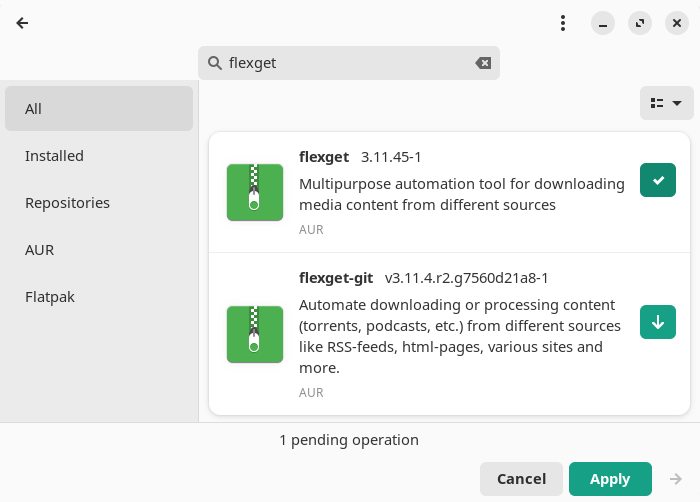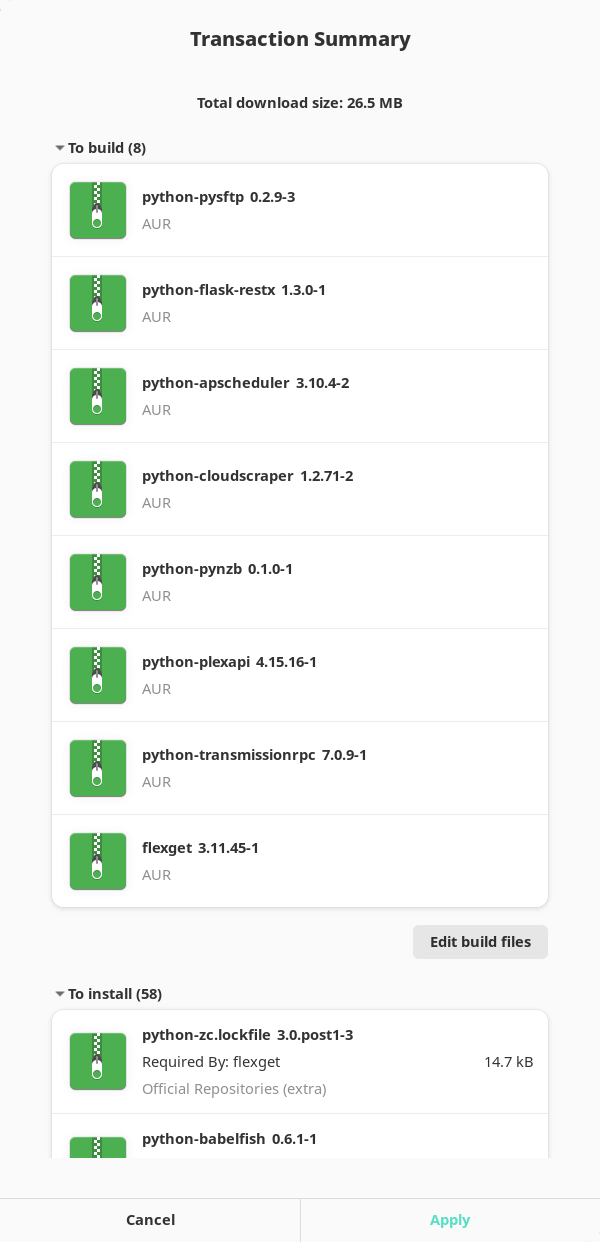FlexGet is a multipurpose automation tool for all of your media. It offers wide support including torrents, nzbs, podcasts, comics, TV, movies, RSS, HTML, CSV, and more.
Installation
We evaluated FlexGet using Manjaro, an Arch-based distro, as well as the ubiquitous Ubuntu.
With Manjaro, Pamac (Manjaro’s front-end installation tool) lets us install from the Arch User Repository (AUR).
The AUR is a community-driven repository. It contains package descriptions (PKGBUILDs) that allow users to compile a package from source with makepkg and then install it via the in-house pacman, a lightweight, simple and fast package manager that allows for continuously upgrading the entire system with one command

The software has so many dependencies, we didn’t expect the build process to go smoothly and would need manual intervention. We were wrong; every single package built with no issues.

Post-Installation
We’re not ready yet to start using FlexGet. You need to manually create a configuration file. FlexGet uses YAML markup in the configuration file. YAML is a way of defining sets of keys (such as plugin names or options) and values (such as series names or path to download files).
On our test system we saved our config file at ~/.config/flexget/config.yml.
Here’s an example config file.
templates:
book:
rss:
url: ''
all_entries: no
# Replace with your Downloader plugin
deluge:
path: '~/Downloading'
queuetotop: yes
accept_all: yes
no_entries_ok: yes
tasks:
book-tv:
priority: 1
# Set your download location and label acording to downloader plugin
set:
movedone: '~/TV/{{ series_name }}'
label: 'TV'
exists_series: '~/TV/{{ series_name }}'
metainfo_series: yes
tvmaze_lookup: yes
require_field:
- tvmaze_series_name
template: book
book-movie:
priority: 2
# Set your download location and label according to downloader plugin
set:
main_file_only: yes
keep_subs: yes
hide_sparse_files: no
movedone: '~/Movies'
label: 'Movies'
metainfo_movie: yes
imdb_lookup: yes
require_field:
- imdb_name
# For IMDB lookup issues failures
if:
- imdb_name == None: reject
template: book
book-other:
priority: 3
metainfo_series: yes
imdb_lookup: yes
tvmaze_lookup: yes
if:
- has_field('imdb_name'):
# For IMDB lookup issues failures
if:
- imdb_name != None: reject
- has_field('tvmaze_series_name'): reject
# Set your download location and label according to downloader plugin
set:
movedone: '~/Other'
label: 'Bookmarks'
template: book
Plugins provide most of the functionality in FlexGet. Plugins usually create, manipulate or download entries but they can also change how FlexGet operates.
Summary
FleXget is a very powerful download tool. For example, it integrates with SABnzbd, Deluge, Transmission, and other clients. It offers very comprehensive series support.
We mostly use the program for an automated podcast listening experience. It’s very useful when in conjunction with applications which have watch directory support.
But it’s essential to study the project’s Cookbook. If you hate editing text file, FlexGet is not for you.
Website: www.flexget.com
Support: GitHub Code Repository
Developer: Chase Sterling, Or Carmi, and many contributors
License: MIT License
FlexGet is written in Python. Learn Python with our recommended free books and free tutorials.
